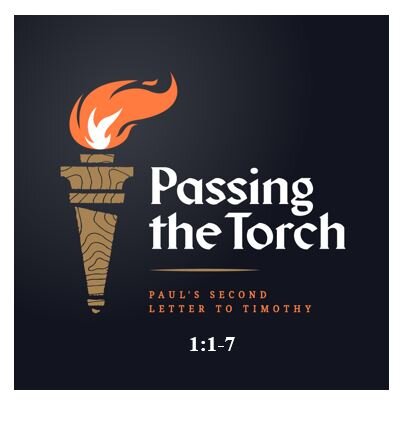BIG IDEA:
THE CHALLENGE FOR THE NEXT GENERATION OF SPIRITUAL LEADERS IS TO BUILD ON A SOLID FOUNDATION OF FAITH WHILE
UNLEASHING THEIR GOD-GIVEN POTENTIAL FOR MINISTRY
I. (:1-2) GREETING
A. Author – Paul – the elder statesman
1. His Mission and Authority – “apostle of Christ Jesus”
He is at the close of his ministry, having fulfilled his mission;
writes like a last will and testament
2. His Calling and Commendation – “through the will of God”
he had not chosen or pursued this ministry in selfish ambition;
he deserves a hearing
Kent: “Paul had no misgivings about the will of God for his life – despite his suffering.”
3. His Hope and Confidence – “according to the promise of life in Christ Jesus”
Significant testimony from one facing a death sentence for the cause of Christ; Paul was not feeling sorry for himself; sets the tone for the whole
epistle = Positive; forward-looking
the threat of death should not make one shy away from preaching the good news of eternal life in Christ
Stedman: “a rather remarkable description of the gospel … it sets them free to be what God intended them to be … everybody has a hunger for life. Nobody wants to be bored, nobody wants to live a dull, meaningless, empty, hollow life… He is talking about life as God intended it to be lived, a quality of life which one can experience right now…”
B. Recipient – Timothy – the fresh blood of emerging leadership
this is a personal letter rather than an epistle to a church
1. Family Relationship = father to his “beloved son”
2. Leadership Relationship = master to his disciple = the next generation of leadership
C. Salutation
1. Blessings – “the ingredients of the promise of life in Christ Jesus” (Stedman)
a. Grace
all of God’s rich resources which we do not deserve
b. Mercy
God withholds many things which we deserve in our sinfulness and tempers our trials so that we can endure
c. Peace
Zeisler: “This is the great ‘shalom’ of God, the iiner calm that keeps you panic proof.” (quoted by Stedman)
2. Blessor – “from”:
a. “God the Father”
b. “Christ Jesus our Lord”
II. (:3-7) SIX WAYS TO GAURANTEE A SUCCESSFUL TRANSITION IN LEADERSHIP
A. (:3A) Pass the Torch in a Spirit of Thanksgiving
1. Directed towards God – “I thank God”
Present tense – ongoing state of thanksgiving
No bitterness over his own condition or resentment towards the growing leadership of Timothy; Instead Paul encourages his leadership
2. Requires no unresolved baggage – “whom I serve with a clear conscience the way my forefathers did”
Only the Lord can cleanse the conscience;
Paul had no regrets; he had been faithful in fulfilling his ministry;
Continuity of ministry with true OT saints; cf. continuity of faith in the family of Timothy
B. (:3B) Pass the Torch with a Consistent Pattern of Intercessory Prayer
“as I constantly remember you in my prayers night and day”
lots of opportunity to pray in prison
C. (:4) Pass the Torch with Genuine Mutual Personal Affection – “longing to see you, even as I recall your tears, so that I may be filled with joy”
The reason for the tears? Possibly because Timothy realized he might never see
Paul again in this life; maybe Timothy had been present when Paul was rearrested
D. (:5) Pass the Torch with Confidence in a Solid Foundation of Faith
“For I am mindful of the sincere faith within you, which first dwelt in your grandmother Lois, and your mother Eunice, and I am sure that it is in you as well”
Martindale: “Faith should be Contagious, catching, attractive to others”
E. (:6) Pass the Torch with Expectation of the Unleashing of Tremendous Ministry Potential
“And for this reason I remind you to kindle afresh the gift of God which is in you through the laying on of my hands.”
Requires Fanning the Flame of your giftedness
F. (:7) Pass the Torch with a Challenge to Demonstrate Courage Based on God’s Equipping
1. Negative: “For God has not given us a spirit of timidity”
Where does it come from? Our fallen human nature; our enemy the devil; God has given us His Holy Spirit and accompanying fruit;
Look how many times Christ commands: “Fear not!” Yet we find it especially difficult to obey this as a command.
Timothy apparently was especially susceptible to this tendency.
2. Positive
a. “power” – How is this power unleashed? What form does it take?
b. “love” – concern for the problems and welfare of others
c. “discipline” / “sound mind” –
Stedman: “It is not fanaticism; it is not talking constantly about dreams, visions, special revelations and wonderful experiences. It is talking about sober, realistic appraisals of a situation, deciding the right thing to do, and then, steadfastly, quietly, moving to do it.”

